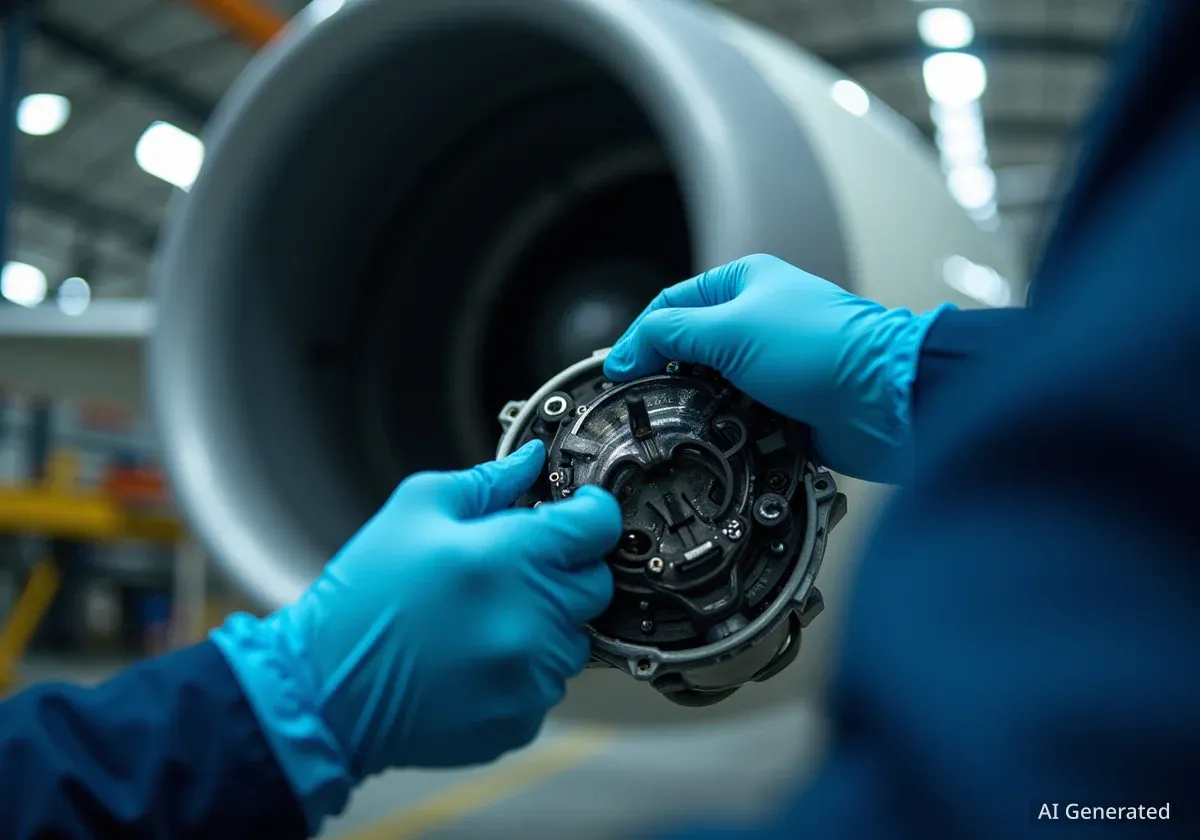Delta Air Lines has started replacing auxiliary power units (APUs) on its fleet of Airbus A320 family aircraft. This action aims to address concerns about toxic fumes entering aircraft cabins. The initiative follows years of requests from flight attendants and other aviation personnel regarding air quality and potential health risks.
Reports indicate that the airline began this significant replacement program in 2022. The decision affects over 300 aircraft in Delta's narrow-body Airbus fleet, representing a major investment in passenger and crew safety and comfort.
Key Takeaways
- Delta Air Lines is replacing APUs on over 300 Airbus A320 family jets.
- The program started in 2022 and targets toxic fume leakages.
- Flight attendant groups have long raised concerns about cabin air quality.
- APU leaks can introduce oil fumes, posing health risks.
- Around 90% of Delta's affected fleet has already received new APUs.
Addressing Cabin Air Quality Issues
An auxiliary power unit, or APU, is a small engine typically located in the tail of an aircraft. Its primary function is to provide electrical power and compressed air when the main engines are not running. This power is essential for starting the main engines and for operating cabin systems on the ground.
The core problem arises when APUs experience oil leaks. These leaks can cause fumes to enter the cabin through the aircraft's 'bleed air' system. The bleed air system draws air directly from the aircraft's engines or APU for cabin pressurization and ventilation. Passengers and crew often describe the smell of these fumes as metallic.
What is Bleed Air?
Bleed air is compressed air taken from jet engines or the APU. It is used for various aircraft systems, including cabin pressurization, air conditioning, and de-icing. Most commercial aircraft, except the Boeing 787, use this system.
Concerns about fume events have grown over time. A report by CBS News highlighted that Delta's program covers more than 300 Airbus A320 family aircraft. The exact cost of this initiative has not been publicly disclosed by the airline.
Data from ch-aviation confirms that Delta operates a total of 321 Airbus A320 family aircraft. This includes various models such as the A319s, A320s, and A321s, all of which are part of the replacement effort.
Health Impacts and Expert Opinions
The presence of toxic fumes in aircraft cabins is a serious health concern. Medical experts have linked exposure to these fumes to various health problems. These can range from temporary discomfort to more severe, long-lasting conditions.
"The fumes are toxic and can cause brain injury and permanent damage to the peripheral nervous system," Robert Kaniecki, a neurologist and consultant to the Pittsburgh Steelers, told the Wall Street Journal.
Dr. Kaniecki has extensive experience treating individuals affected by fume exposure. Over the past two decades, he has provided care for approximately a dozen pilots and more than 100 flight attendants. These individuals suffered brain injuries directly linked to fume events on aircraft.
One notable case involved a frequent Delta Air Lines passenger. This passenger, who held top-tier status with the airline, experienced an injury in 2023 due to fume exposure. This incident underscores that the issue affects not only crew members but also passengers.
Historical Context of Fume Events
Fume events have been a recognized problem in the aviation industry for many years. Flight attendant unions and pilot associations worldwide have consistently advocated for improved cabin air quality. They emphasize the need for air free from harmful concentrations of gases or vapors.
An investigative report by the Wall Street Journal in September 2025 indicated a rise in fume events. The report suggested that the problem was worsening and that effective solutions were slow to be implemented. Many of these incidents were specifically linked to leaks on Airbus A320 family jets.
Delta's Fleet and Future Deliveries
Delta Air Lines has a substantial fleet of Airbus aircraft. The Atlanta-based carrier currently operates 518 Airbus jets. Out of these, 321 belong to the A320 family, which is Airbus's best-selling narrow-body series.
- Airbus A321-200s: 127 aircraft, average age 6.8 years.
- Airbus A321neos: 83 aircraft, average age 1.9 years.
- Airbus A319s: 57 aircraft, average age 23.7 years.
- Airbus A320-200s: 54 aircraft, average age 29.5 years.
The airline's A320 family fleet includes a mix of older and newer generation aircraft. The A319s and A320-200s have notably higher average ages, suggesting they might be more prone to such issues due to wear and tear.
Looking ahead, Delta is expecting delivery of 72 additional A321neos. It is not yet known whether these new aircraft will come equipped with the updated APUs or if they will require future modifications. The ongoing replacement program aims to mitigate risks across the existing fleet.
CBS News reported that Delta has already completed APU replacements on approximately 90% of its current Airbus A320 family fleet. This high completion rate shows the airline's commitment to resolving the issue.
Industry-Wide Efforts and Alternatives
Delta is not the only airline addressing fume issues. Other carriers are also implementing measures to improve cabin air quality and prevent fume events. The problem is a recognized industry challenge.
United Airlines CEO Scott Kirby has stated that he has focused on this issue for more than ten years. United employs a "proactive maintenance program." This program involves monitoring engine oil consumption and pressure. It also includes replacing APU seals before they fail, aiming to prevent oil leaks and the release of fumes into the cabin.
Pilot and flight attendant associations globally continue to advocate for safer cabin air. They highlight that some fume events are severe enough to require flight crews to use oxygen masks, underscoring the critical nature of the problem.
Potential Solutions and Technologies
The aviation industry is exploring various technological solutions to enhance cabin air safety. One significant alternative to the traditional bleed air system is bleed-free pressurization. This approach eliminates the need to draw air directly from the engines or APU for cabin air supply.
The Boeing 787 Dreamliner, for example, uses a bleed-free system. This design significantly reduces the risk of engine-generated contamination. The International Federation of Air Line Pilots' Associations (IFALPA) notes that bleed-free systems have been successfully tested on retrofits of other aircraft types, including the Airbus A320 and ATR72.
Another potential solution involves advanced bleed air filtration systems. These filters could remove harmful particles and gases before the air enters the cabin. While the industry continues to evaluate these options, Delta's APU replacement program represents a direct and immediate action to enhance safety on its Airbus fleet.
The long-term goal for the industry is to ensure that all aircraft cabins provide consistently clean and safe air for everyone on board. Delta's current efforts contribute to this broader objective by directly addressing a known source of cabin air contamination.





